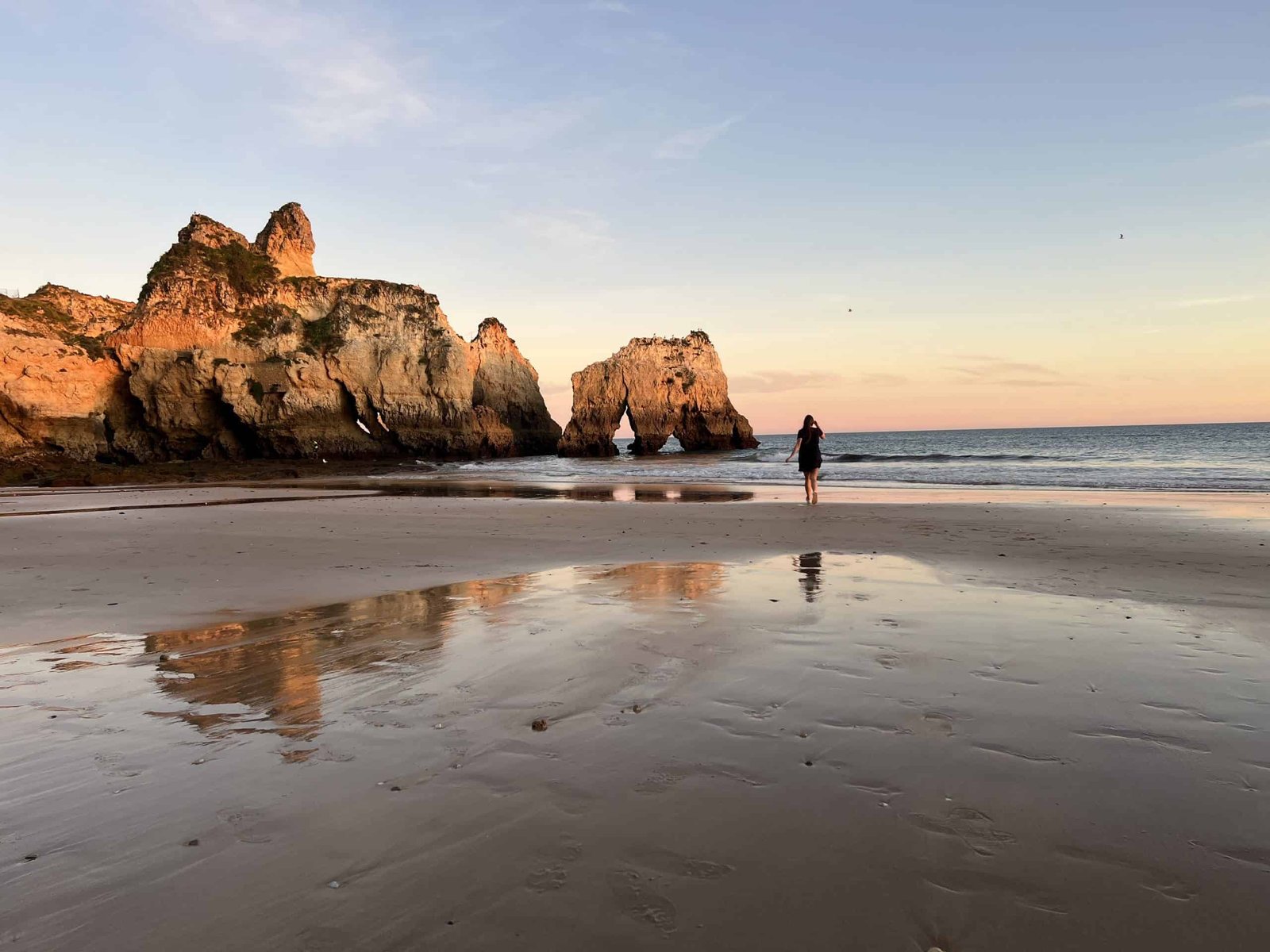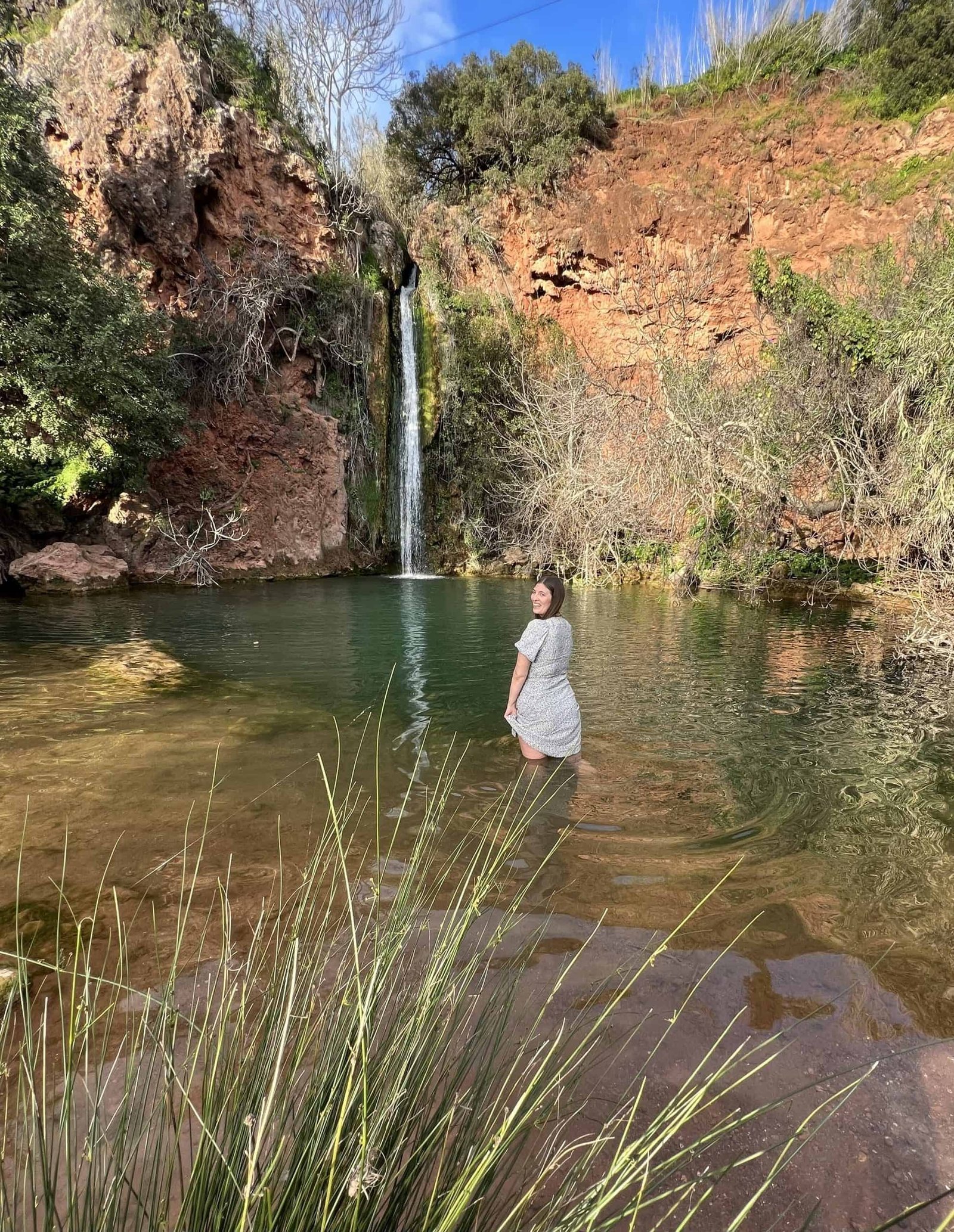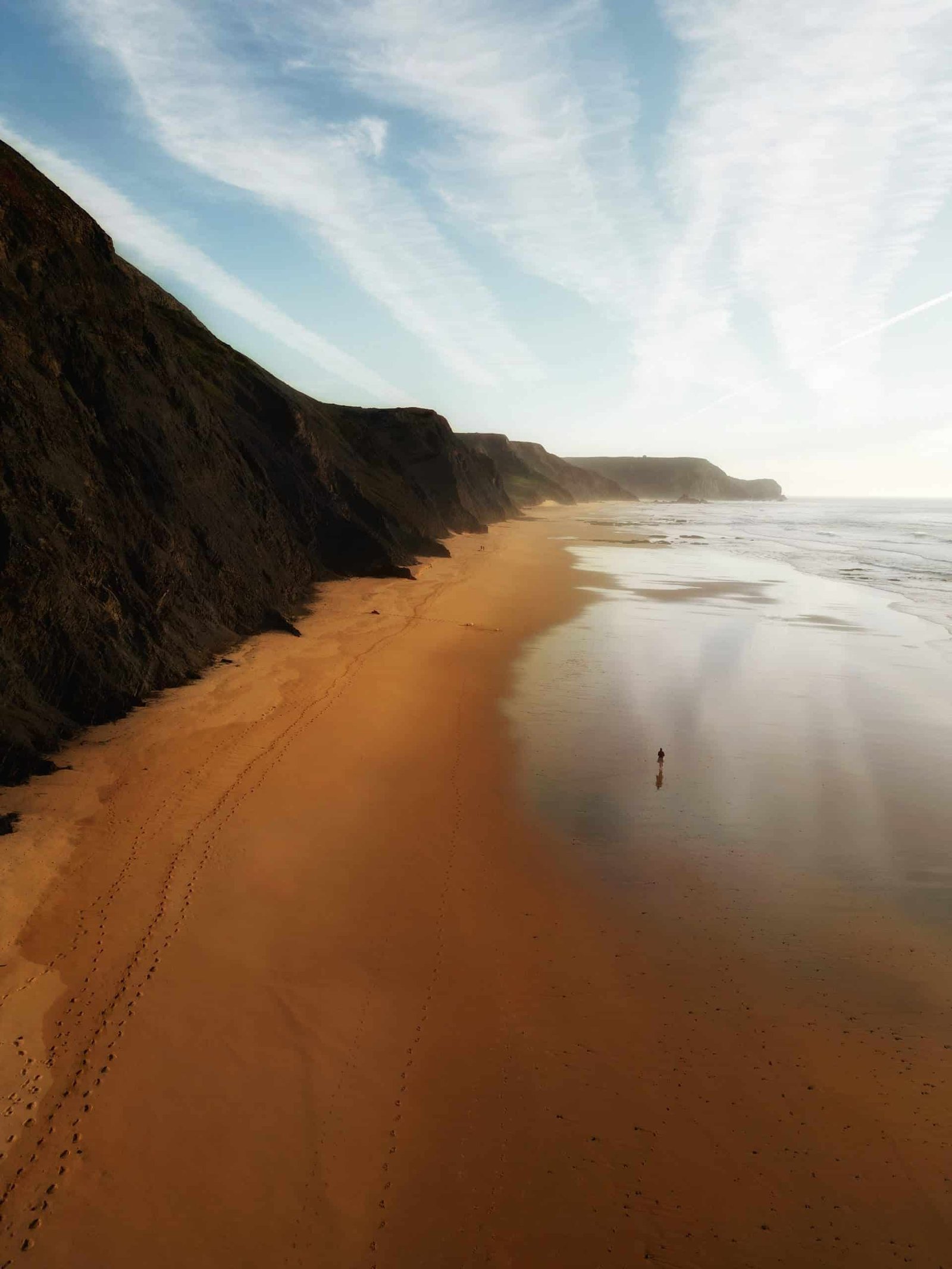Portugal is a country where history, culture, and stunning landscapes come together, making it one of Europe’s most rewarding travel destinations. From sun-drenched coastlines to historic cities and world-class cuisine, Portugal offers a diverse experience for every traveler. Lisbon, the capital, blends tradition with modern energy, featuring historic trams, scenic viewpoints, and the charming Alfama district with its narrow streets and Fado music. Visitors can explore landmarks like Belém Tower, the Jerónimos Monastery, and the vibrant Mercado da Ribeira. Just north, Porto captivates with its colorful riverside district, the iconic Dom Luís I Bridge, and renowned port wine cellars in Vila Nova de Gaia. The Douro Valley, a UNESCO-listed wine region, offers breathtaking landscapes with terraced vineyards and wine tastings at historic estates. The Algarve in the south is famous for its golden beaches, dramatic cliffs, and picturesque towns like Lagos and Tavira, making it a paradise for beach lovers and outdoor enthusiasts. Sintra, a fairytale-like town near Lisbon, boasts the colorful Pena Palace, mystical Quinta da Regaleira, and lush forests perfect for exploring. Beyond its landscapes, Portugal’s food scene is a highlight, from fresh seafood dishes like bacalhau and grilled sardines to the famous pastéis de nata. Warm hospitality, a relaxed pace of life, and a relatively affordable cost of travel make Portugal an inviting destination for both short getaways and extended stays. Whether wandering through medieval streets, hiking along coastal cliffs, or enjoying a glass of vinho verde at a local café, Portugal offers an unforgettable experience at every turn.
Table of Contents
Quick Facts
Language
Portuguese
Religion
Christianity (predominantly Roman Catholic)
Currency
Euro (EUR)
Capital
Lisbon
Visa
Portugal is part of the Schengen Area, meaning that visa requirements depend on your nationality. Citizens of the EU, EEA, and many countries including the US, UK, Canada, and Australia can enter visa-free for up to 90 days within a 180-day period for tourism.
Climate
Mediterranean climate, characterized by hot, dry summers and mild, wet winters.
Power Plugs
Type F power plugs and sockets, which have two round prongs and are compatible with Type C and Type E plugs. The standard voltage is 230V, and the frequency is 50Hz.
Apps
Google Maps, Moovit, Uber, Bolt, etc.
Emergency Numbers
112 for police, fire, and medical assistance
Tipping
typically round up the bill or leave 5-10% for excellent service in Restaurants
Time Zone
Western European Time (WET, UTC+0) during standard time and switches to Western European Summer Time (WEST, UTC+1) from the last Sunday in March to the last Sunday in October. The Azores Islands are one hour behind mainland Portugal, following Azores Time (AZOT, UTC−1) in winter and Azores Summer Time (AZOST, UTC+0) in summer.
Transportation
Comboios de Portugal (CP), Alfa Pendular, Rede Expressos, FlixBus, Carris, Metro de Lisboa, Metro do Porto, Uber, Bolt, FREE NOW, ferries, TAP Air Portugal, SATA Azores Airlines, electric scooters, bicycle and cat rentals.
Language
Portuguese
Religion
Christianity (predominantly Roman Catholic)
Currency
Euro (EUR)
Capital
Lisbon
Visa
Portugal is part of the Schengen Area, meaning that visa requirements depend on your nationality. Citizens of the EU, EEA, and many countries including the US, UK, Canada, and Australia can enter visa-free for up to 90 days within a 180-day period for tourism.
Climate
Mediterranean climate, characterized by hot, dry summers and mild, wet winters.
Power Plugs
Type F power plugs and sockets, which have two round prongs and are compatible with Type C and Type E plugs. The standard voltage is 230V, and the frequency is 50Hz.
Apps
Google Maps, Moovit, Uber, Bolt, etc.
Emergency Numbers
112 for police, fire, and medical assistance
Tipping
typically round up the bill or leave 5-10% for excellent service in Restaurants
Time Zone
Western European Time (WET, UTC+0) during standard time and switches to Western European Summer Time (WEST, UTC+1) from the last Sunday in March to the last Sunday in October. The Azores Islands are one hour behind mainland Portugal, following Azores Time (AZOT, UTC−1) in winter and Azores Summer Time (AZOST, UTC+0) in summer.
Transportation
Comboios de Portugal (CP), Alfa Pendular, Rede Expressos, FlixBus, Carris, Metro de Lisboa, Metro do Porto, Uber, Bolt, FREE NOW, ferries, TAP Air Portugal, SATA Azores Airlines, electric scooters, bicycle and cat rentals.
Where is Portugal?
Portugal is in Southern Europe, bordering Spain and the Atlantic Ocean, including the Azores and Madeira islands.
TUBS, CC BY-SA 3.0, via Wikimedia Commons
What to do in Portugal?
Portugal offers a diverse range of activities, from exploring historic cities to enjoying stunning natural landscapes. In Lisbon, wander through the Alfama district, ride the iconic Tram 28, visit the Belém Tower, and enjoy sunset views from Miradouros. In Porto, stroll along the Ribeira district, cross the Dom Luís I Bridge, and taste world-famous Port wine in Vila Nova de Gaia. The Douro Valley offers scenic boat cruises and wine tastings at hillside vineyards. Beach lovers can relax on the Algarve’s golden beaches, explore dramatic sea caves like Benagil, or surf the world-class waves in Nazaré. For cultural experiences, visit Sintra’s fairytale palaces, discover medieval towns like Óbidos, or explore the ancient university city of Coimbra. Outdoor enthusiasts can hike in Peneda-Gerês National Park, go dolphin watching in Setúbal, or take a scenic drive along the Alentejo coast. The Azores and Madeira offer breathtaking nature, with volcanic landscapes, lush forests, and fantastic hiking trails like Pico Mountain and Levada walks. Whether you’re into history, nature, food, or adventure, Portugal has something for every traveler.
Caves in Portugal
Portugal is home to stunning caves, both inland and along the coastline, offering breathtaking natural formations and adventurous exploration. The Benagil Cave in the Algarve is the most famous, featuring a massive sea cave with a natural skylight, accessible only by boat, kayak, paddleboard or swimming. Nearby, the Algar Seco caves in Carvoeiro offer dramatic rock formations and sea-carved tunnels. The Grutas de Mira de Aire, near Fátima, is Portugal’s largest cave system, with underground lakes, stalactites, and guided tours showcasing its immense chambers. The Alvados and Santo António Caves, also in central Portugal, offer fascinating limestone formations. In the Azores, the Algar do Carvão on Terceira Island is a volcanic cave with an open lava tube and a crystal-clear underground lake.
Waterfalls in Portugal
Portugal is home to beautiful waterfalls, often hidden in lush forests and mountainous regions. In Peneda-Gerês National Park, Cascata do Tahiti is a stunning multi-tiered waterfall with natural pools, while Cascata do Arado offers an easily accessible cascade surrounded by rugged scenery. The Frecha da Mizarela, in the Serra da Freita mountains, is Portugal’s highest waterfall, plunging over 75 meters into a rocky valley. In Madeira, 25 Fontes Waterfall is a must-see, located in a lush laurel forest with multiple streams feeding into a crystal-clear lagoon. The Azores boast impressive waterfalls like Salto do Prego on São Miguel Island, hidden within a tropical forest, and Salto do Cabrito, a powerful cascade surrounded by volcanic rock formations. In the Algarve, Queda do Vigário, near Alte, is a picturesque waterfall with a refreshing swimming spot, perfect for a relaxing escape from the heat. Many of these waterfalls feature hiking trails and swimming areas, making them ideal for nature lovers and adventure seekers. Please keep in mind that Portugal is a very dry destination and that Waterfalls might not have any water during the summer months.
Beaches in Portugal
Portugal is famous for its stunning beaches, offering everything from golden sand and dramatic cliffs to surfing hotspots and hidden coves. The Algarve is home to some of the most beautiful beaches, including Praia da Marinha, known for its limestone cliffs and turquoise waters, and Benagil Beach, famous for its nearby sea cave. Praia da Falésia in Albufeira stretches for miles with striking red cliffs, while Meia Praia in Lagos offers soft sand and calm waters. For surfers, Nazaré is legendary for its record-breaking waves, while Ericeira is a top surfing destination with world-class breaks. Near Lisbon, Praia da Ursa is a remote and wild beach near Cabo da Roca, and Cordoama Beach is popular for its easy access and great surf opportunities. On the Costa Vicentina, Praia da Arrifana offers dramatic coastal scenery, while Praia do Amado is perfect for surf lovers. The Azores and Madeira also boast breathtaking beaches, such as Porto Santo’s golden sands and the unique volcanic shores of Praia de Santa Bárbara in São Miguel.
Wildlife in Portugal
Portugal is home to diverse wildlife, ranging from marine life along the Atlantic coast to unique species in its forests, mountains, and islands. Peneda-Gerês National Park shelters Iberian wolves, wild horses (Garranos), golden eagles, and deer, making it a prime spot for wildlife enthusiasts. The Serra da Estrela mountains are home to the Iberian ibex and various birds of prey. Along the coastline and islands, marine life thrives—dolphins and whales can be spotted in the Azores, one of the world’s best whale-watching destinations, while Madeira offers encounters with monk seals and sea turtles. Portugal’s wetlands, such as the Ria Formosa Natural Park in the Algarve, provide a habitat for flamingos, storks, and other migratory birds. The Sado Estuary near Setúbal is home to a rare resident dolphin population, while the Berlengas Islands off the coast of Peniche support nesting seabirds like Cory’s shearwaters.
Portuguese Food
Portuguese cuisine is rich in fresh seafood, hearty meats, and traditional pastries, reflecting the country’s maritime heritage and regional diversity. Bacalhau (salted cod) is a national staple, prepared in countless ways, including Bacalhau à Brás (with eggs and potatoes) and Bacalhau com Natas (with cream). Grilled sardines, especially during Lisbon’s summer festivals, are a must-try. In Porto, Francesinha, a hearty sandwich layered with meat, cheese, and beer sauce, is a local favorite. The Alentejo region is known for its porco preto (black pork), while the Algarve offers delicious seafood like cataplana de marisco (seafood stew). Portugal’s pastries are legendary, with pastéis de nata (custard tarts) being the most famous. Wine lovers can enjoy Port wine from the Douro Valley, Vinho Verde from the north, and the sweet Madeira wine.
Tours in Portugal
Portugal offers a variety of tours catering to different interests, from history and culture to adventure and gastronomy. City walking tours in Lisbon and Porto explore historic districts like Alfama and Ribeira, often including food tastings and Fado music experiences. Wine tours in the Douro Valley, Alentejo, and Vinho Verde regions offer vineyard visits and tastings of world-class wines. Boat tours along the Tagus River, Douro River, or Algarve coast provide scenic views, while Benagil cave tours showcase Portugal’s stunning sea caves. Surfing lessons in Nazaré, Ericeira, and Peniche attract wave enthusiasts, while hiking tours in Peneda-Gerês National Park, Madeira, and the Azores offer breathtaking landscapes. Day trips to Sintra, with stops at Pena Palace, Quinta da Regaleira, and Cabo da Roca, are among the most popular. For food lovers, pastel de nata baking classes, seafood experiences, and market tours highlight Portugal’s rich culinary scene.
Budget
Portugal is one of the most affordable destinations in Western Europe, offering great value for travelers with different budgets. Budget travelers can get by on €40–€70 per day, staying in hostels (€15–€30 per night), using public transport, and enjoying inexpensive meals at local cafés (€5–€10). Mid-range travelers spending €80–€150 per day can stay in boutique hotels (€50–€100 per night), dine at traditional restaurants (€15–€25 per meal), and enjoy tours or activities. Luxury travelers can expect to spend €200+ per day, staying in high-end hotels (€150+ per night), dining at fine restaurants (€40+ per meal), and booking private experiences. Public transport is affordable, with metro or bus tickets costing around €1.50, while rental cars start at €25 per day. Portugal remains a great value-for-money destination compared to other Western European countries.
Regions of Portugal
Lisbon and the Tagus Valley is home to the vibrant capital, historic landmarks, and nearby fairytale-like Sintra. Porto and the North is known for the Douro Valley wine region, medieval towns like Guimarães, and the cultural hub of Porto. The Algarve, in the south, is famous for its golden beaches, dramatic cliffs, and fishing villages like Lagos and Tavira. Alentejo, with its rolling plains, historic castles, and vineyards, offers a slower-paced experience in towns like Évora and Monsaraz. Central Portugal features diverse landscapes, from the mountains of Serra da Estrela to the medieval town of Óbidos. The Azores, a volcanic archipelago in the Atlantic, is known for whale watching, crater lakes, and hot springs, while Madeira, the “Island of Eternal Spring,” offers lush landscapes, Levadas (irrigation trails), and coastal cliffs. Each region showcases a different side of Portugal, making the country incredibly diverse and rewarding to explore.
The Portuguese People
The people of Portugal, known as Portuguese, are known for their warm hospitality, strong cultural traditions, and relaxed lifestyle. Family and community play a central role in daily life, and there is a deep pride in heritage, music (like Fado), and cuisine. Portuguese people are generally friendly, welcoming, and patient with visitors, often happy to share local recommendations. While Portuguese is the official language, many people, especially in cities and tourist areas, speak English. The culture reflects a mix of European, African, and South American influences, shaped by Portugal’s maritime history. Locals value simplicity, tradition, and good food, enjoying long meals and gatherings.
Portuguese Infrastructure
Portugal has a well-developed infrastructure, offering modern transportation, healthcare, telecommunications, and utilities. The road network includes well-maintained highways and scenic coastal routes, though some toll roads require electronic payment. Public transportation is efficient, with metro systems in Lisbon and Porto, an extensive rail network, and reliable bus services connecting cities and rural areas. Airports in Lisbon, Porto, and Faro provide international connections, while regional airports serve the islands of Madeira and the Azores. Healthcare is of high quality, with public hospitals and private clinics available nationwide. Internet and mobile coverage are strong, with widespread Wi-Fi access in cities and tourist areas. Portugal also invests in renewable energy, with a significant portion of its electricity coming from wind and solar power.
Portugal's Airports
Portugal has several international and domestic airports, with the main hubs being Lisbon Portela Airport (LIS), Porto Francisco Sá Carneiro Airport (OPO), and Faro Airport (FAO), serving the Algarve region. In the Azores, the largest airport is Ponta Delgada João Paulo II Airport (PDL), while Madeira Cristiano Ronaldo Airport (FNC) connects the island to mainland Europe. Other regional airports include Funchal (FNC), Terceira (TER), and Horta (HOR). Lisbon and Porto are the busiest airports, offering global connections, while Faro primarily serves European holiday destinations.
Is Portugal safe?
Portugal is considered one of the safest countries in the world, with a low crime rate and a welcoming atmosphere for travelers. Petty crimes like pickpocketing can occur in tourist areas, especially in Lisbon, Porto, and public transport, so staying aware of belongings is advised. The country is politically stable, and violent crime is rare. Road safety is generally good, but rural roads can be narrow and winding. Beach safety is important, as some Atlantic waves and currents can be strong, particularly in Nazaré and the Algarve. Travelers should follow local emergency guidelines for wildfires, especially in summer. The emergency number in Portugal is 112.

Hi! We’re Maxi and Gerrit – two adventurers with a passion for traveling, meeting amazing people, and uncovering hidden gems around the world.
.
For us, it’s not just about capturing the perfect photo (though we love doing that, too). It’s about diving into the unknown, exploring places off the beaten path, and discovering the extraordinary in the unexpected..
.
At the end of a thrilling and sometimes exhausting day, there’s nothing better than savoring delicious food – that’s our simple recipe for happiness. Join us as we share our stories, experiences, and the joy of exploring life’s wonders!




